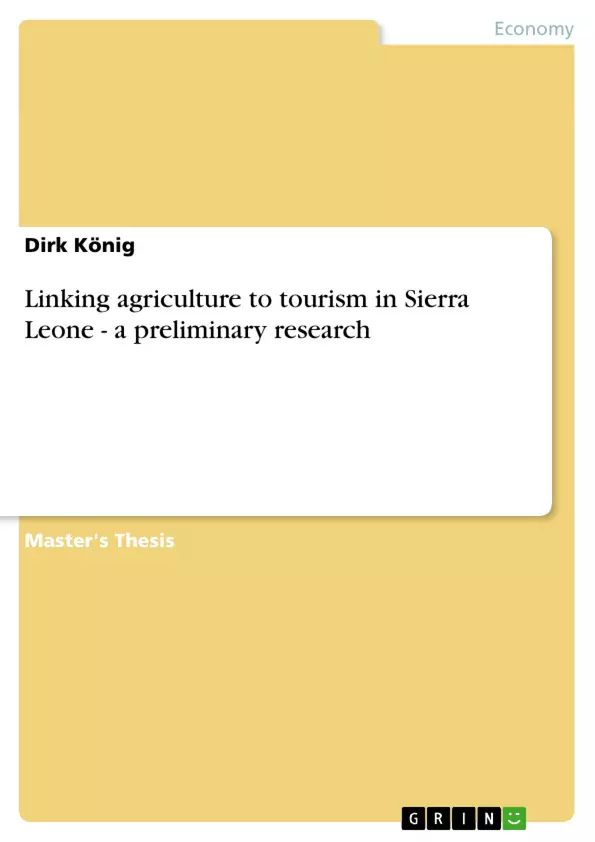Tourism has been acknowledged by practitioners and governments to be a tool for economic development, not exclusively but mainly, of less developed countries with few other competitive sectors and, therefore, for boosting their domestic economy as well as reducing the endemic poverty in Africa.
This paradigm is difficult to apply when the tourism industry is not viable in a country and the great majority of tourism establishments have insufficient numbers of clients to make profit.
In this respect, some findings indicate that, tourism and local small-scale agriculture (World Bank, 2006b) have been widely neglected by the Government of Sierra Leone, all efforts having been directed onto the development of the mining sector. In fact, while production and marketing constraints can be solved as stated in the wider agriculture literature, due to the nature of Sierra Leone as a “fragile state”, findings suggest that the lack of commitment and attitude of the Government to more responsible tourism forms or approaches will hamper any attempt to foster strategic alliances between the poor agriculture sector and tourism industry or other lucrative market-segments. Although the recent tourism development in Sierra Leone addresses the important issue of preserving the few available tourist attractions, an overall (responsible) tourism destination management integrating all stakeholders and planning consequently the steps leading to competitiveness, as in the case of The Gambia, is still lacking.
That tourism benefits will automatically “trickle down” and boost other sectors of the economy, mainly agriculture, is a widely spread belief; yet empirical evidence is still lacking. On the contrary, the literature review indicates that tourism might harm the already neglected and weak agriculture of less developed countries through increased food imports to satisfy the new foreign demand.
Inhaltsverzeichnis (Table of Contents)
- Executive Summary
- Chapter 1: Introduction and Research Objective
- Chapter 2: Literature Review on Tourism as a Poverty Reduction Tool
- Factors Influencing Agri-Tourism Linkages
- Case Study: Agri-Tourism Backward-Linkages in The Gambia
- Chapter 3: Research Framework and Methods
- Chapter 4: Sierra Leone's Fragile Socio-Political Context
- Chapter 5: Overview of the Food Sub-Sectors Analyzed
- Chapter 6: Discussion and Recommendations
Zielsetzung und Themenschwerpunkte (Objectives and Key Themes)
This master thesis examines how fostering backward-linkages between tourism and agriculture, as a pro-poor tourism strategy and an approach to enhance destination competitiveness, can contribute to poverty reduction in developing countries, particularly in Sierra Leone.
- Tourism as a poverty reduction tool
- Agri-tourism linkages and their impact on poverty
- Challenges and opportunities in promoting local food consumption in Sierra Leone
- The role of government and international donors in promoting tourism and agriculture in fragile states
- The potential for sustainable tourism and pro-poor strategies in Sierra Leone
Zusammenfassung der Kapitel (Chapter Summaries)
- Chapter 1: Introduction and Research Objective This chapter introduces the research topic and outlines the thesis's objectives.
- Chapter 2: Literature Review on Tourism as a Poverty Reduction Tool This chapter explores the existing literature on tourism as a poverty reduction tool, focusing on the factors influencing agri-tourism linkages. It includes a case study on successful agri-tourism initiatives in The Gambia, highlighting their pro-poor impact.
- Chapter 3: Research Framework and Methods This chapter outlines the research framework and methods used in the study, including data collection techniques and the specific areas of focus.
- Chapter 4: Sierra Leone's Fragile Socio-Political Context This chapter provides a general overview of Sierra Leone's socio-political context, including its dependence on foreign aid and the declining tourism sector.
- Chapter 5: Overview of the Food Sub-Sectors Analyzed This chapter presents an analysis of the food sub-sectors, examining the structure and linkages among actors, and identifying constraints and opportunities related to the agriculture-tourism nexus.
Schlüsselwörter (Keywords)
The key terms and focus topics of this thesis include: pro-poor tourism, agri-tourism linkages, poverty reduction, sustainable tourism, destination competitiveness, Sierra Leone, fragile states, international donors, food security, and local food consumption.
Frequently Asked Questions
Can tourism help reduce poverty in Sierra Leone?
Yes, by creating backward-linkages to the local agricultural sector, tourism can boost the domestic economy and provide income for the poor.
What are "backward-linkages" in agri-tourism?
It refers to the process where tourism establishments (hotels, restaurants) source their food and supplies from local small-scale farmers instead of importing them.
Why is Sierra Leone considered a "fragile state" for tourism?
Due to historical instability, a lack of government commitment to responsible tourism, and heavy reliance on the mining sector.
What can Sierra Leone learn from The Gambia?
The Gambia has successfully integrated stakeholders and managed destinations to increase competitiveness and pro-poor impact.
Does tourism always benefit agriculture?
Not necessarily; without strategic planning, tourism can harm local agriculture by increasing food imports to meet foreign demand.
- Arbeit zitieren
- Dirk König (Autor:in), 2007, Linking agriculture to tourism in Sierra Leone - a preliminary research, München, GRIN Verlag, https://www.grin.com/document/91629



